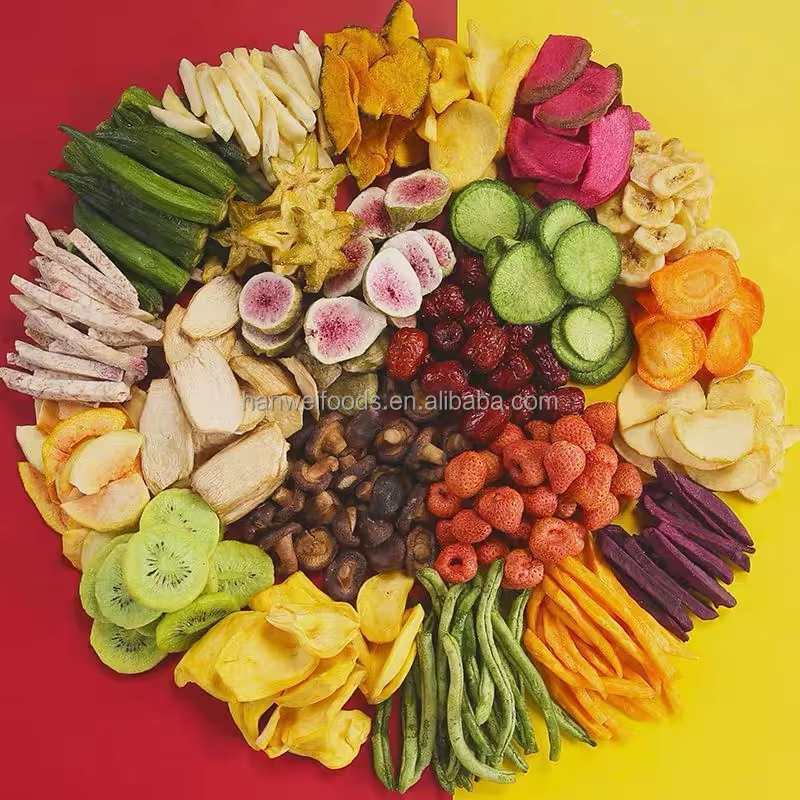These days, with cities growing and our work schedules getting more and more hectic, we all need food that's easy to grab but still full of good stuff. That's where dried vegetable and fruit snacks come in. They're like little powerhouses for people who care about their health. You see, when fruits and vegetables are dried, all the vitamins, minerals, and fiber get concentrated, and they can stay good for a long time on the shelf. This is super convenient for busy professionals, students who are always on the go, and families with active lifestyles. We can just toss a pack of these snacks in our bags and know we're getting something nutritious without having to worry about spoilage or spending a lot of time preparing food. It's a great way to keep up with our dietary goals even when we're rushed off our feet.
Modern ways of drying fruits and vegetables are really amazing. They can keep up to 90% of all the good nutrients that were originally in them. By getting rid of the moisture that makes things go bad, we end up with snacks that are full of natural antioxidants. Think about it, in dried citrus fruits, you've got all that vitamin C, and in dried tomatoes, there's lycopene. These antioxidants are great for our immune system and help keep our cells healthy. Also, if you munch on dried apple rings or beet chips, the fiber in them helps our digestion and makes us feel full. This is really useful if you're trying to manage your weight. And guess what? Recent studies show that if you regularly eat these dried snacks instead of processed sweets, they can even help keep your blood sugar levels in check.

When we're out shopping for these dried snacks, we need to be smart. We should look for products that are dried at low temperatures. This way, the fruits and vegetables keep their nice color and texture, and they don't need any extra additives. Certifications that say the ingredients are non - GMO and have no preservatives are a big plus. And here's a little tip - when you pick up a pack of dried mango slices, for example, they should be bendy, not rock - hard. That's a sign they're properly dried. Also, smart shoppers like us should compare different brands to see which ones keep the most nutrients. Brands that tell us how much of each vitamin is left after processing are the ones we should go for.
Smart nutritionists have some great ideas on how we can use these dried fruits and vegetables in our daily meals. For breakfast, we can add them to our cereals to get more fiber. Or, we can blend powdered versions into our smoothies to give them an extra nutrient boost. If we want to use them in salads or grain bowls, we can rehydrate them, and they'll be almost like fresh produce again. Even food service places are catching on. They're using these dried ingredients to make menu items that are good for people who are vegan or need to avoid gluten. And because these dried products last a long time, they also help cut down on food waste.
People are getting really creative with these dried fruits and vegetables. In professional kitchens and at home, chefs are using them in all sorts of new ways. They're grinding dried tomatoes into a really flavorful seasoning powder that has that delicious umami taste. Mixologists are putting dried citrus peels into their fancy cocktails to add a new twist. Nutrition researchers are even looking into making fortified versions with plant - based proteins for athletes to help them recover. And the pharmaceutical industry is starting to take notice too. They're interested in using freeze - dried fruit compounds to make new health products.
Drying fruits and vegetables is not only good for us but also for the planet. By drying the extra produce that's in season, we're stopping a lot of food from going to waste, which is a big part of the circular economy idea. Also, dried products are light, so they don't produce as much pollution when they're being transported compared to fresh ones. And because they last a long time, there's less chance of them going bad in the stores. Even small farmers are getting in on the action. Agricultural cooperatives are using solar - powered dehydration methods. This gives smallholder farmers a way to make money all year round and helps make sure there's enough food in places where the climate makes it hard to grow things all the time.
 Hot News
Hot News